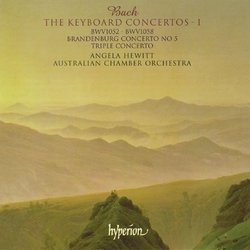| All Artists: Bach, Angela Hewitt, Richard Tognetti, Australian Chamber Orchestra Title: Bach - The Keyboard Concertos Vol 1 Members Wishing: 2 Total Copies: 0 Label: Hyperion UK Original Release Date: 1/1/2005 Re-Release Date: 6/13/2005 Album Type: Import Genre: Classical Styles: Chamber Music, Forms & Genres, Concertos, Historical Periods, Baroque (c.1600-1750), Classical (c.1770-1830) Number of Discs: 1 SwapaCD Credits: 1 UPCs: 034571173078, 003457117307 |
Search - Bach, Angela Hewitt, Richard Tognetti :: Bach - The Keyboard Concertos Vol 1
 | Bach, Angela Hewitt, Richard Tognetti Bach - The Keyboard Concertos Vol 1 Genre: Classical This delectable collection of Bach Keyboard concertos is so unsullied by tradition or a point to prove that the listener is left refreshed. Angela Hewitt plays with such warmth and song-like smoothness in the slow movement... more » |
Larger Image |
CD DetailsSynopsis
Amazon.com This delectable collection of Bach Keyboard concertos is so unsullied by tradition or a point to prove that the listener is left refreshed. Angela Hewitt plays with such warmth and song-like smoothness in the slow movements that they are little islands of repose in the midst of Bach's perky outer movements, which Hewitt and conductor-violinist Richard Tognetti launch with unmatched verve, rhythmic thrust and quick-but-never-rushed tempi. The Fifth Brandenburg and the Triple Concerto also call for a violin and flute and Togneti and Alison Mitchell are ideal partners to Hewitt: the give and take seems simply like great "jamming." Every note is clear and each soloist (and the fine Australian Chamber Orchestra) adds ornaments which are pert and welcome. The big cadenza in the Fifth Brandenburg is like liquid--beautifully flowing and well-articulated by Hewitt--and while the virtuosity is never in doubt, she never draws attention to herself. She plays a modern piano and the Orchestra play modern instruments, but early-music performance practice and style are very much in evidence (including a harpsichord in the continuo section). This is Bach playing of the highest order and splendid entertainment. --Robert Levine Similar CDs
|
CD ReviewsFans of Hewitt will rejoice; everyone else may look askance Larry VanDeSande | Mason, Michigan United States | 11/11/2005 (3 out of 5 stars) "You never know what's going to come back into style in classical music, do you? With Murray Perhaiah and now Angela Hewitt playing the Brandenburg Concerto No. 5 from the modern grand piano, we seemingly have gone backwards in time to the era of the great pianists and wax recordings in the early 20th century. Hewitt plays the traditional Bach keyboard concerti Nos. 1 and 7 from the piano and contributes a performance of the Bach "Triple" Concerto from the concert grand to fill out this well-stocked disk of Bach wonders. I only wish I had more wonderful things to say about the goings on. What I find most unattractive about these renditions -- aside from the very unstylistic inclusion of a concert grand piano in the Brandenburg and Triple concerti -- is the way the combined forces mix styles. In the opening Concerto No. 1 for keyboard, Hewitt at times produces a sonority that is more appropriate for Brahms than Bach. She is matched by a scrawny sounding period band from Autstralia. This combination of Brahmsian piano and period string band...well, it just doesn't come off very well for me. Other than her occasionally overripe tone and romantic sonority, I don't quibble with Hewitt's approach for the most part. She is a known commodity in Bach and her work here is similar to everything else she's done with this composer. Only a highly romanticized cadenza at the conclusion of the Triple Concerto -- which probably comes off best among the four concerti recorded here -- seems wayward. On the pluse side, the opening movement of the Concerto No. 1 is pushed very hard in Bach style and the middle section of the Concerto No. 7 is very beautiful. It works well in the piano concertos but elsewhere seems to me to be a step backward to a time when people thought Bach surely must have meant to include a concert grand piano where he only had the limitations of the clavichord and harpsichord at his disposal. Where this error in judgment is most apparent is in the Brandenburg Concerto No. 5. Listen to that long harpsichord solo at the end of the first movement by any good recording using a harpsichord, then come back to this recording and notice the way the piano not only lacks color throughout the concerto but almost seems to disappear at the same junction. At other times, the concerto grand overwhelms the thin tone of Richard Tognetti's violin and Alison Mitchells flute, both here and in the Triple Concerto. This, to me, is what most renders this recording a curiosity and not essential Bach musicmaking. I think this recording will be accepted with open arms by fans of Hewitt and those that hanker for a return to the era of Alfred Cortot's recordings of the Brandenburgs circa 1931. For others, this recording will more likely be considered an oddity to be heard once and discarded." A mix of good and not so good Donley Parmentier | Sunnyvale, CA USA | 03/01/2006 (4 out of 5 stars) "A problem for me with performances of harpsichord music on pianos is that the pianist often uses way too much pedal. Not that I want a piano to sound like a harpsichord-- but the cadenza at the end of the first movement of Brandenburg 5 did make me cringe. It was so smeared that sometimes notes disappeared. In other places, there seemed to be very out of place fortissimos that distracted one from the line of the music. All that said, Hewitt excellent pianism often shines through-- I was hearing musical lines that have not been in evidence in other recordings. The soloist performance I'd rate 3 stars; the support of the Australian Chamber Orchestra and the generally excellent sound bumps the overall rating to 4." Wonderful but Richard Cotter | Blairgowrie, Victoria Australia | 02/26/2006 (4 out of 5 stars) "I very much enjoyed Angela Hewitt's playing in Bach's keyboard concertos. Some might quibble that they are played on a piano, but horses and carts have also been replaced by motor cars. The ACO is one of Australia's treasures - described in London as the world's best chamber orchestra - and it gives Hewitt wonderful support. (The prolific reviewer Larry VanDeSande has eleswhere described the ACO as "a scrawny sounding period band" but LVDS seems to have sacrificed integrity for effect - he might equally describe the Chicago orchestra as "overblown and conventional"). The real problem with Hewitt and the ACO is that equally fine performances at a fraction of the cost can be found on Naxos with Hae-won Chang (piano) and the Camerata Cassovia. Fair dinkum and I kid you not."
|

